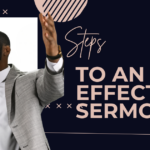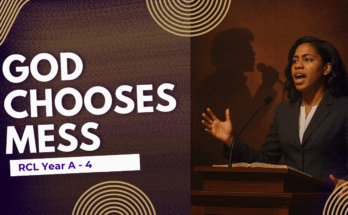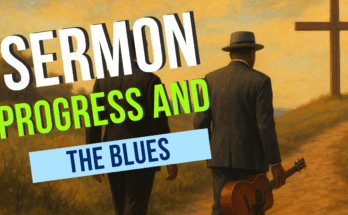As an Amazon Associate I earn from qualifying purchases.
The sermon is not a Biblical lecture designed merely to inform the hearer of some interesting facts. It is not merely a place where you can learn different stories from the Bible. Certainly it includes that, but no it is more than that. The sermon is a vehicle for an encounter with the Most High God. This encounter does “inform,” but it also provides hope, healing, direction, salvation, etc. Because of this, preachers should embed in the sermon an expectation of a response from the congregation.
This response may be a heartfelt question like, “What must I do to be saved?” The response might be an assurance that God will be with us through a painful circumstance. The response might be a resolve to live with more loyalty to God’s coming Kingdom. There may be other responses, but the point is that the encounter with God changes humanity and that change will manifest itself in some way.
Every sermon should ask the people for some sort of response. However, before one can ask such a thing, the preacher must connect what is taught to the lived experience of the congregation.
Doctrinal Sermons need to Connect to Human Experience
Many sermons, especially “doctrinal” ones, neglect this connection to human experience. We preachers sometimes think that preaching the “truth” is all that is needed. So we preach sermons that follow an outline much like the following:
1) Teach the doctrine
2) Defend the doctrine from a few angles
3) Tell people they need to believe the doctrine
 I heard a sermon on the trinity like this. The preacher read a few texts that taught the doctrine of the trinity. The preacher then defended the doctrine from a few attacks that are sometimes heard. The preacher then closed by calling us all to hold on to this doctrine. He then sat down. Note that the people don’t know why the doctrine is important. They do not know how to apply it in daily life.
I heard a sermon on the trinity like this. The preacher read a few texts that taught the doctrine of the trinity. The preacher then defended the doctrine from a few attacks that are sometimes heard. The preacher then closed by calling us all to hold on to this doctrine. He then sat down. Note that the people don’t know why the doctrine is important. They do not know how to apply it in daily life.
Lowry’s Homiletical Plot Approach
In contrast, I read where Eugene Lowry stated the following on page 18 of the book Homiletical Plot:
I am considering the possibility of a doctrinal sermon on the Trinity, the preliminary question to be asked is: What problem or bind does the trinitarian formula resolve?
Here the preacher will be looking at how the doctrine does solve some problem. Does the trinity tell us something about community? Does the trinity guide us in some way? Perhaps the trinity provides a vehicle for understanding God’s total investment in humanity’s salvation. Whatever the case, when we go to preach a doctrine it should be connected to human experience if we expect to be able to make an appeal to the importance of the doctrine.
Now it is true that some people neglect doctrine as if it is unimportant. That is another issue we shall take up later. But when you preach doctrine, informing others is important, but helping the people to understand the doctrine in such a way that it will change the way they live is also important. And most important is to allow the doctrine to facilitate the encounter with the God that we hope to experience in the worship service.
Amazon and the Amazon logo are trademarks of Amazon.com, Inc, or its affiliates.







If this is done than we will become better Christians and 2 Thessalonians 2:7 can be fulfilled.
Thank you for the reminder of the “human” element of the gospel. I don’t know if some would consider it in error but I always try to approach my sermons with the thought of how to apply the biblical truth that God is revealing to me. “How does this relate to my everyday life in my walk with Christ.” So far I have not been steered wrong with this approach.
I agree 100% you have to live your sermon in front of the congregation because some folk never been to church and some don’t know the first thing about Jesus, so they have to be able to see God in us.
Brother Cox this information is for your ears only. I don’t believe the public can receive this understanding at this point.
Your question is very complicated; this I believe is what you are looking for. But first I must say that I contemplated deeply about putting this burden on you until I heard the voice of a dove cooing at my window. I felt compelled by the Holy Spirit to extend this burden to you. First, I believe that the word of God only teaches one doctrine. One God that is over all and in all, one Lord Jesus the Christ, one Baptism of the Spirit and one doctrine which is to love thy neighbor as He has loved us. This new commandment The Lord Jesus taught His disciples at the last supper the same day that He was crucified. Secondly, It is reported that on that same day, at the same supper that the Lord also instituted the New Covenant. To understand what the New Covenant specifies let’s look at Jeremiah 31:31-34. Verse 33; I shall put my law in their hearts. This is the same as; I will pour my Spirit upon them. Verse 34; they shall no more teach every man his neighbor saying know the lord for they all shall know me from the least to the greatest. This statement abolishes preaching in the new covenant. You will find these same sentiments in: Joel 2:28, Acts 2:17, Hebrews 8:8-11, Matthew 26:28, Mark 14:24, Luke 22:20 and 1corinthians 11:25. The saddest thing of all is that God has already taken in to account the idolatrous and unbelieving nature of this present age. It is written that this present age will not last to its full term, that it shall be shorten for the Elects sake. That’s a sad testimony; this is the most ungodly age of all. It is so ungodly that it has to be cleansed by fire. The preachers are to be the servants and leaders of the people, making sure the success of the churches. We are suppose to be establishing God’s kingdom here on earth and if we focus on that God would not allow the evil to overflow and began the end time sequence of events. Be Blessed.